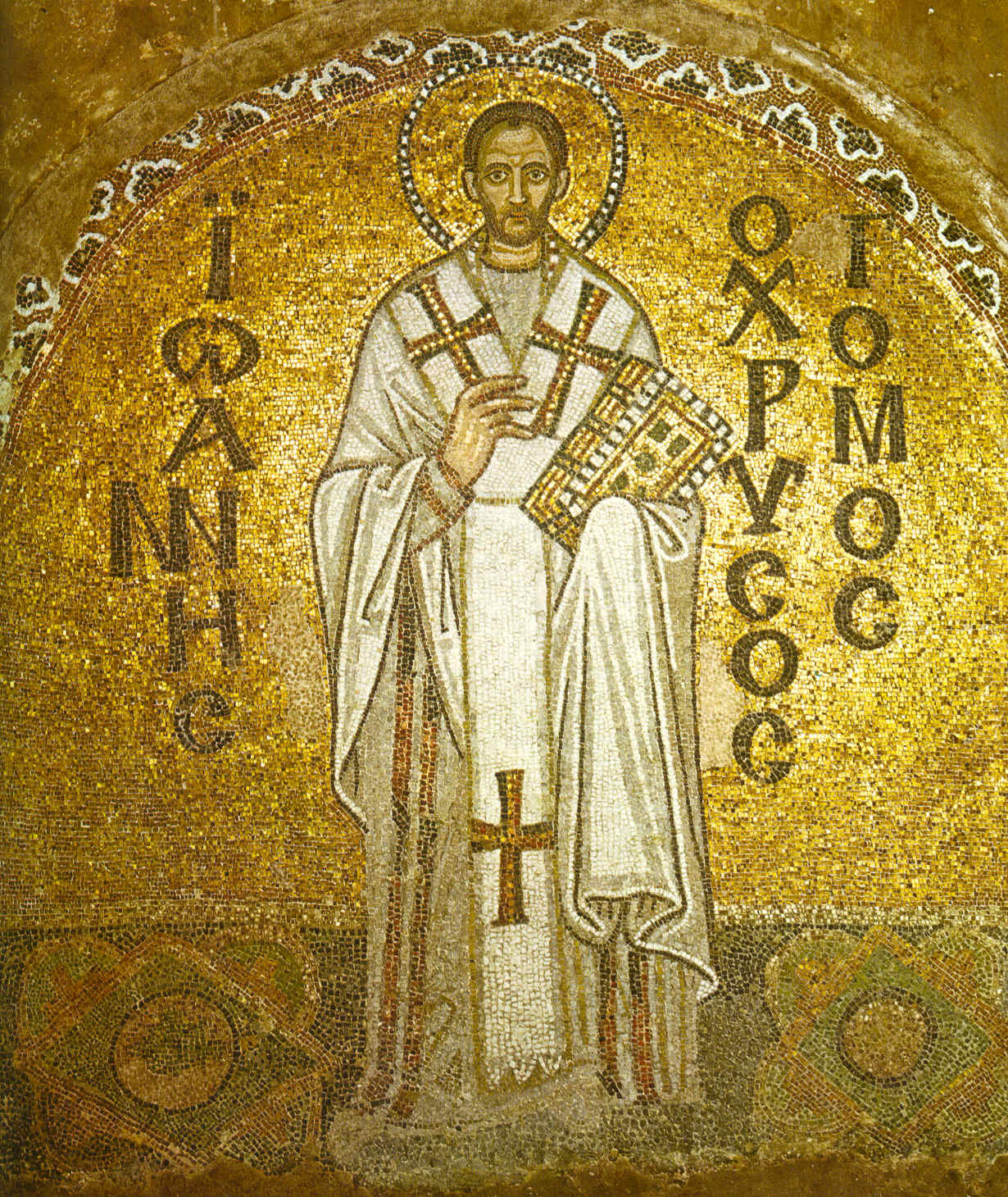Giovanni Crisostomo frasi celebri
da Quales ducendae sint uxorem, 4
“Non ci sarebbero più pagani, se ci comportassimo da veri cristiani.”
Origine: Da In Ep. ad Tim. 3, hom. 10. Citato in Francesco Gioia, La grazia e le grazie, Messaggero di San'Antonio, febbraio 2010, p. 8.
Origine: Citato in Andrew Linzey, Teologia animale, traduzione di Alessandro Arrigoni, Cosmopolis, Torino, 1998, p. 11. ISBN 978-88-87947-01-4
Frasi su Dio di Giovanni Crisostomo
Commento alle lettere di s. Paolo ai Corinti
Frasi su Cristo di Giovanni Crisostomo
Commento alle lettere di s. Paolo ai Corinti
Omelie
Giovanni Crisostomo Frasi e Citazioni
Origine: Citato in San Paolo per ogni giorno dell'anno, prefazione di M. Alberione, Pia Società San Paolo, 1942.
Commento alle lettere di s. Paolo ai Corinti
Predica di capodanno
“Il mio e il tuo sono pure e semplici parole: non hanno un fondamento reale.”
Origine: Citato in Ermes Ronchi, Il canto del pane, Edizioni San Paolo, 2006, p. 83.
Commento alle lettere di s. Paolo ai Colossesi
da Commentario sull'epistola ai Romani, Omelia 4
Origine: Citato in Cesare Cantù, Sant'Atanasio, Biografie per corredo alla storia universale Vol. I, pp. 502-503.
Attribuite
“Chi è amato, infatti, si muove a suo piacimento nell'intimo del cuore che lo ama.”
Commento alle lettere di s. Paolo ai Corinti
Commento alle lettere di s. Paolo ai Corinti
Commento alle lettere di s. Paolo ai Corinti
Commento alle lettere di s. Paolo ai Colossesi
Commento alle lettere di s. Paolo ai Colossesi
Omelie
Giovanni Crisostomo: Frasi in inglese
St. John Chrysostom, Homily 24 on the Epistle to the Romans [PG 60:626-27] https://www.patheos.com/blogs/davearmstrong/2017/10/contraception-early-church-teaching-william-klimon.html
“I do not think there are many among Bishops that will be saved, but many more that perish”
St. John Chrysostom, Homily III on Acts 1:12
Contesto: I do not think there are many among Bishops that will be saved, but many more that perish: and the reason is, that it is an affair that requires a great mind.
Homilies on the Gospel of Saint Matthew http://www.ccel.org/ccel/schaff/npnf110/Page_303.html, Homily L
Homilies on the Gospel of Saint John http://www.ccel.org/ccel/schaff/npnf114.iv.lxxxiii.html, Homily LXXXI
Homily on Romans IV http://www.newadvent.org/fathers/210204.htm
On the Priesthood http://www.ccel.org/ccel/schaff/npnf109/Page_41.html, Book II
Homilies on the Statues http://www.ccel.org/ccel/schaff/npnf109/Page_474.html, Homily XX
Homilies on the Statues http://www.ccel.org/ccel/schaff/npnf109/Page_476.html, Homily XX
Homilies on the Gospel of Saint John http://www.ccel.org/ccel/schaff/npnf114.iv.xxiii.html, Homily XXI
Paschal Homily
Luke 19:27
Eight Homilies Against the Jews http://www.fordham.edu/halsall/source/chrysostom-jews6.html, Homily 1
Homilies on Ephesians http://www.ccel.org/ccel/schaff/npnf113/Page_144.html, Homily XX
Paschal Homily
Saint John Chrysostom (349–ca. 407), Eight Homilies Against the Jews http://www.fordham.edu/halsall/source/chrysostom-jews6.html, Homily 1
Homilies on the Statues http://www.ccel.org/ccel/schaff/npnf109/Page_456.html, Homily XVII
Paschal Homily
Both English Wikipedia and English Wikisource contain the whole text of this homily. In Byzantine Rite churches, the whole homily is read out annually as part of Paschal Matins service.
Homilies on Timothy http://www.ccel.org/ccel/schaff/npnf113/Page_429.html, Homily VII
Reported in Josiah Hotchkiss Gilbert, Dictionary of Burning Words of Brilliant Writers (1895), p. 98
Homilies on the Gospel of Saint John http://www.newadvent.org/fathers/240103.htm, Homily III
Homilies on the Statues http://www.ccel.org/ccel/schaff/npnf109/Page_472.html, Homily XX
Epist. i. ad Tim., 12, as cited in Francesco Saverio Nitti, Catholic Socialism (1895), p. 67
“Nothing is so apt to draw men under teaching, as to love, and be loved.”
Homily 6 on First Timothy https://www.newadvent.org/fathers/230606.htm
